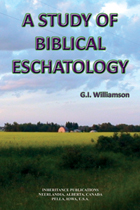
G. I. Williamson
Reviewed by: Archibald A. Allison
A Study of Biblical Eschatology, by G. I. Williamson. Inheritance Publications, 2015. Paperback, 153 pages, list price $10.95. Reviewed by OP pastor Archibald A. Allison.
After more than sixty-two years in the Christian ministry, G. I. Williamson has written a book to explain biblical eschatology to ordinary Christians. Two of the "things which are necessary to be known, believed, and observed for salvation" are the doctrines of creation and consummation, which "are so clearly propounded, and opened in some place of Scripture or other, that not only the learned, but the unlearned, in a due use of the ordinary means, may attain unto a sufficient understanding of them" (
WCF 1.7). This small book will encourage you to study the text of the Bible and see for yourself that, although no one has all the answers to questions about the future, the main things we need to know about the future are clearly revealed in Scripture.
After clearly stating five time-tested principles of sound Bible interpretation, Williamson defines eschatology as "whatever God has revealed concerning things still in the future at the time when God revealed them" (p. 9). He summarizes the eschatology of the Old Testament, focusing on God's promises to the nation of Israel and the various visions that God gave the prophet Daniel concerning the four great world kingdoms leading up to the time of Christ. He concludes, "There is no other event in the history of the world that rises to the level of importance of that momentous time when the Jewish nation, as a whole, was disenfranchised by the Lord Jesus" (p. 19). From this we learn that biblical, doctrinal, and spiritual qualities define the true church, not organizational continuity.
One of the reasons for so much confusion in eschatology is the loss or weakening of "reformational principles of biblical exegesis" (p. 26). Williamson explains the importance of "grammatico-historical exegesis," rather than looking at the text of the Bible from the perspective of the twenty-first century and changing its meaning. The rest of the book sets forth the eschatology of the New Testament. He gives a careful exegesis of Matthew 23–26, focusing on things that are commonly misunderstood and the most difficult points. He looks at the Thessalonian letters and compares three basic types of interpretation of 2 Thessalonians 2:1–12. He compares the most common interpretation of the texts in the Epistles of John concerning the Antichrist with what the texts actually say.
About half the book is an exposition of the book of Revelation, carefully comparing Scripture with Scripture and showing that John restates the same things Jesus taught in Matthew, Mark, and Luke. Williamson gives six concluding statements, the last of which is
WCF 33.3. The final chapter gives confirmation from other evidence in Scripture and the confessions. Throughout the book are questions for further study and discussion. Buy a copy of this refreshing, accessible study of Scripture that sets forth the certainties of biblical eschatology, study it, and share it with others.
September 07, 2025
August 31, 2025
J. N. Darby and the Roots of Dispensationalism
August 24, 2025
August 17, 2025
Reformed Covenant Theology: A Systematic Introduction
August 10, 2025
August 03, 2025
July 27, 2025
© 2025 The Orthodox Presbyterian Church